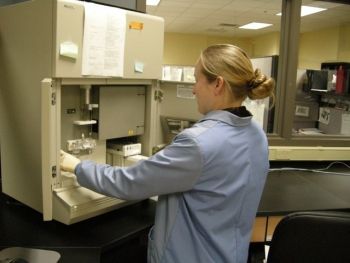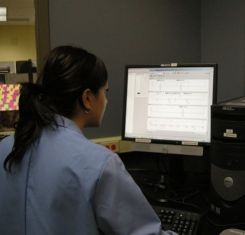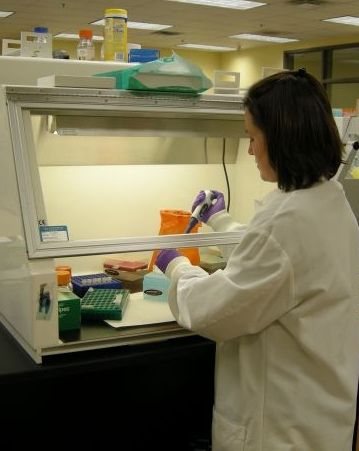
Publisher:
Bonnie King
CONTACT:
Newsroom@Salem-news.com
Advertising:
Adsales@Salem-news.com

~Truth~
~Justice~
~Peace~
TJP
Apr-23-2008 11:46

 TweetFollow @OregonNews
TweetFollow @OregonNews
New Oregon Law Allows Use of DNA in Missing Person Cases
Salem-News.comAn April 2008 check of the Law Enforcement Data System showed 1,379 missing person records, police hope the new law will bring that number down.
 Photos courtesy: Oregon State Police |
(PORTLAND, Ore.) - "Missing" - one of those words that definitely perks our interest, but it can be frightening when used regarding a loved one.
An amendment to Oregon's Missing Person law will help families who have missing relatives by adding the tool of DNA analysis to the investigation through providing an important DNA sample that may be useful when a relative is missing, making it easier to identify a loved one's remains when they are found.
Effective since the 1st of Jamuary, Senate Bill 351, the New Missing Persons Law, provides that if a person has been reported as missing, and has not been located within 30 days after the missing person report is made, the investigating law enforcement agency shall attempt to obtain a DNA sample for the missing person.
Susan Hormann, DNA Supervisor at the Oregon State Police Portland Forensic Laboratory, noted that the DNA for a missing person investigation can be collected a couple ways. The first is to collect items that were used only by the missing person such as a tooth brush, razor, lipstick or a medical specimen preserved at a hospital.
The second is to collect oral swabs from family members; a simple and painless process by swabbing the inside cheek of their mouth for about 10 – 15 seconds.
 Marla Kaplan from the OSP DNA Unit |
The FRS kits are supplied free from the University of North Texas Center for Human Identification (UNT CHI), and over 4,800 kits have been sent to Oregon law enforcement agencies to assist in collecting DNA samples related to missing person investigations.
The collected samples will be sent to UNT CHI where the DNA will be analyzed at a state-of-the-art facility, federally funded to offer free DNA analysis of the FRS and unidentified remains. Results are put in a National DNA database of family members of missing persons.
"The success of this law will depend on police training, public awareness and on the number of families that come forward and give FRS samples," said Hormann.
"Medical examiners and forensic scientists encourage families who have missing relatives to come forward even if the person has been missing for many years because the DNA technology is able to verify remains that are very old."
 Janelle Scott of the OSP DNA unit doing lab work |
If unidentified after these processes, the Oregon State Medical Examiner's Office will decide if the remains will be sent to UNT CHI for DNA analysis. At UNT CHI the remains will be analyzed using two types of DNA analysis and the results will be entered into the National database for unidentified remains.
When a computer program is run comparing the National database of family reference samples to the unidentified remains database, it is looking for matches indicating a genetic relationship that the relatives would share. When a match is identified, the agencies that submitted the FRS and the unidentified remains will both be notified.
This program has the capabilities to identify newly recovered remains and remains that have been in storage for years at medical examiner facilities across the country.
"Theoretically, a family who is missing a relative in Oregon could find that their loved one was found in New York. The distance has been a problem when investigating these cases and never before has a resource utilizing DNA been available to assist in the closure of these cases," Hormann said.
An April 2008 check of the Law Enforcement Data System (LEDS) showed 1,379 missing person records. Those listed as missing include:
* 6 people missing and believed to be the victim of a disaster.
* 59 people missing of any age with a proven physical/mental disability, or who is senile, thereby subjecting himself/herself or others to immediate danger.
* 292 people of any age missing under circumstances indicating his/her physical safety may be in danger.
* 113 people of any age that is missing under circumstances indicating that the disappearance was not voluntary.
* 821 juveniles who are missing and do not qualify for entry in any other the above other categories.
* 19 people missing whose circumstances do not fit into any other category.
Since January 2008, LEDS sends out a message to police agencies with a missing person record between 30 and 60 days old as a reminder to help seek a request for a DNA sample. According to Keith Kohan, LEDS Unit Manager, the reminder program is helping.
"When we first implemented the program back in January, the response from agencies was 100 percent positive," said Kohan.
"We received many thanks from agencies who are trying to figure out how they could best comply with this new law in an organized and responsible fashion, and this new program is helping do that."
Since more than half of the missing person LEDS entries involve juveniles, the Oregon State Police Missing Children Clearinghouse (MCC) emphasizes to parents to be proactive by preparing an identification kit and keep it in their home so it could be available during the first hours a child is missing. The MCC provides free child identification kit that includes an area for a picture, fingerprints, dental records, physical information, and a DNA sample.
Funding for the kits is provided each year from the proceeds of an annual golf benefit tournament. Since 1999, the clearinghouse has been able to purchase over 125,000 ID kits that have been distributed throughout Oregon. To order a kit, please call 503-934-0188 or toll free outside Salem at 1-800-282-7155. You may also email your request to judy.hayes@state.or.us. Kits may be ordered individually or in limited quantities for community and service groups, clubs, and schools. More information about the Missing Children's Clearinghouse is available on our website at:
oregon.gov/OSP/MCC/index.shtml
Source: Oregon State Police
Articles for April 22, 2008 | Articles for April 23, 2008 | Articles for April 24, 2008






Terms of Service | Privacy Policy
All comments and messages are approved by people and self promotional links or unacceptable comments are denied.
[Return to Top]
©2025 Salem-News.com. All opinions expressed in this article are those of the author and do not necessarily reflect those of Salem-News.com.